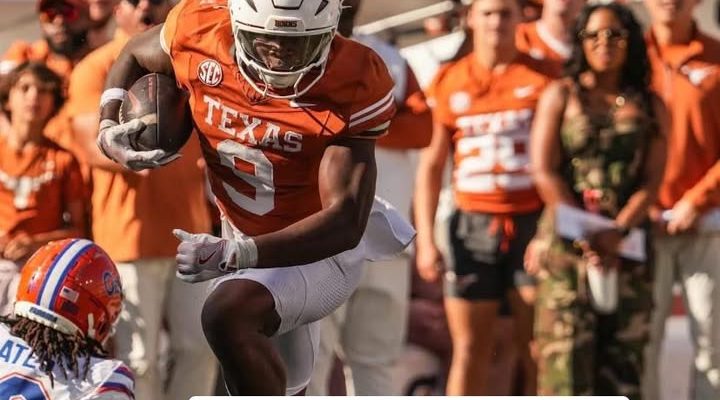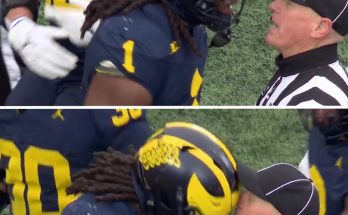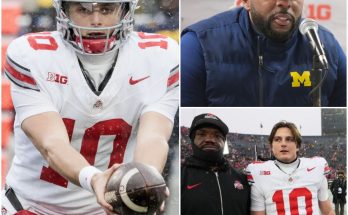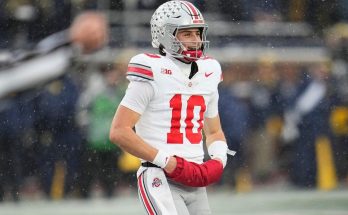Texas Football Shake-Up: Backup RB Jerrick Gibson Departs Longhorns After Contributing 152 Yards and a Touchdown This Season
The Texas Longhorns have seen their share of ups and downs in recent seasons, but few developments come at a more delicate time than the sudden departure of sophomore running back Jerrick Gibson. A player who brought energy, potential, and flashes of brilliance to the field, Gibson’s exit leaves both questions and opportunities in its wake. For a team with championship aspirations and a demanding fan base, the move signals not just the loss of a promising athlete, but also a pivotal moment in Texas’ season — one that may force both coaches and players to recalibrate their approach as the Longhorns push deeper into conference play.
Jerrick Gibson’s departure from the program was confirmed earlier this week, and though official details surrounding his exit remain limited, the ripple effects are already being felt. The 6-foot, 200-pound running back had seen consistent rotational action behind the starter this season, logging 37 carries for 152 rushing yards and a touchdown. His role might not have been headline-grabbing, but it was meaningful — he was the kind of depth player that championship-caliber teams rely on when injuries strike or when fresh legs are needed late in games.
The loss of any contributor in a program like Texas might seem minor on paper, but it’s often these departures that tell a larger story. Gibson was a top recruit, a player with four-star potential who arrived in Austin with expectations of growing into a key offensive weapon. He had the combination of speed, balance, and vision that made him a versatile threat out of the backfield, capable of turning routine carries into big gains. While his touches were limited this year, his flashes were enough to intrigue fans and keep defensive coordinators on alert.
Now, the question becomes why he’s gone — and what comes next.
Sources close to the program have hinted that Gibson’s departure was not due to any single event, but rather a culmination of circumstances — playing time, competition, and the natural friction that sometimes arises in deep, talent-laden rosters. The Longhorns have one of the most competitive backfields in the country, filled with players vying for limited snaps. With the offense flowing primarily through established starters, opportunities for younger players like Gibson can be hard to come by. For ambitious athletes looking to make an impact now, rather than later, the decision to move on can often feel inevitable.
Still, this isn’t just about a single player leaving. For Texas, it’s about maintaining balance and focus in the midst of transition. Every football season is a marathon, and roster changes — whether due to transfers, injuries, or coaching decisions — are part of the rhythm of college football. Yet when those changes involve players with clear potential, it tends to stir conversation among fans and analysts alike.
Texas head coach Steve Sarkisian now faces the challenge of keeping the locker room steady while adjusting his offensive rotation. Sarkisian has long emphasized the importance of depth and adaptability, traits that have allowed his teams to remain competitive even when adversity strikes. Gibson’s exit, while significant, may open the door for another young back to step forward — perhaps freshman phenom or a veteran reserve who’s been waiting for his chance. In college football, departures often create space for new stories, and that may well be the case here.
From a broader perspective, Gibson’s decision highlights an ongoing shift across the NCAA landscape. The transfer portal has made mobility easier than ever before, allowing players to make swift career adjustments in search of better opportunities. What was once seen as rare — a midseason departure from a major program — has become increasingly common. Players today are more empowered to take control of their narratives, weighing immediate playing time and development opportunities against long-term potential. For Gibson, whose natural ability suggests he could thrive in a different offensive system, this move could represent a fresh start rather than a setback.
But for Texas, the timing could not be more delicate. The Longhorns are deep into a season filled with high expectations, with fans and alumni eyeing a potential playoff run. The program has been steadily climbing under Sarkisian’s leadership, building a culture defined by accountability, confidence, and competitive drive. In that context, losing a player mid-season — even a backup — introduces an element of unpredictability. It tests not just the roster’s depth, but also the team’s mental resilience.
Inside the locker room, leadership will be critical. Veteran players, particularly on offense, must help keep morale high and ensure that distractions are minimized. The departure of a teammate can have emotional weight — especially for younger players who have trained side by side since recruitment. Yet for most teams, these moments become defining. Programs like Texas are built not just on talent, but on the ability to adapt, respond, and continue pushing forward.
Gibson’s contribution to the Longhorns this season might not have been statistical headline material, but his consistency mattered. He was reliable in short-yardage situations, provided strong special teams effort, and brought energy during crucial stretches. His 152 yards came largely in rotational play, often in the second half of games where the Longhorns needed steady production to close out opponents. His lone touchdown — a powerful burst through the middle — symbolized the kind of toughness and efficiency coaches value in backup runners.
That’s part of what makes his exit feel bittersweet for fans. There’s disappointment in losing a player with untapped potential, but also an understanding that college football careers don’t always follow a straight path. For many players, the journey is about finding the right fit — the right system, the right coaching philosophy, and the right timing. If Gibson finds that elsewhere, it may ultimately prove beneficial for both sides.
Recruiting analysts have long viewed Gibson as a player with a high ceiling. Coming out of high school, he was praised for his combination of acceleration and power, often compared to some of the more dynamic backs in recent Texas history. He possessed the kind of build that could handle volume carries, and scouts often noted his ability to maintain balance through contact. In Sarkisian’s system, which values versatility and creativity, he seemed like a natural fit. But with so much talent already in the room, carving out a long-term role was always going to be a challenge.
Now, with Gibson gone, Texas will likely turn to its next wave of runners. The coaching staff has consistently emphasized “next man up” — a philosophy that ensures readiness across the board. Depth has been one of the program’s strengths this year, and it will need to remain so as the season grinds on. Whether it’s a younger back stepping into Gibson’s spot or a positional shift that redistributes the workload, the Longhorns will aim to keep their offensive balance intact.
Beyond the tactical adjustments, Gibson’s departure also raises questions about the broader evolution of Texas’ football identity. Under Sarkisian, the Longhorns have emphasized culture — accountability, trust, and player development. Every departure, voluntary or otherwise, becomes a test of that culture’s strength. The way Texas handles this transition will speak volumes about its maturity as a program. A focused, unified response could turn what might seem like a setback into another stepping stone in the team’s growth.
The fan reaction has been mixed. On social media, many expressed disappointment, citing Gibson’s potential and work ethic. Others, however, took a more pragmatic stance, recognizing that roster fluidity is part of modern college football. As one fan wrote, “You can’t keep everyone happy in a top-tier program — the best will always compete, and the rest will look for somewhere to shine.” That sentiment captures a truth that every powerhouse program faces: talent depth is both a blessing and a burden.
For Gibson, the road ahead is uncertain but filled with opportunity. His limited but promising game tape at Texas will undoubtedly draw interest from other programs, particularly those looking for a running back with proven ability in Power Five competition. Whether he chooses to stay within the same conference or explore new territory, his next chapter will likely be watched closely by those who followed his early days in Austin.
For Texas, meanwhile, the focus remains forward. The season is far from over, and the Longhorns still have every reason to believe in their goals. The team’s offensive unit has been efficient, the defense improving, and the leadership core strong. In the grand scheme, one player’s departure won’t derail the mission — but it does serve as a reminder of how quickly dynamics can change in college football.
The Texas Longhorns are at a crossroads that every competitive program eventually encounters — balancing the pursuit of excellence with the realities of roster evolution. Jerrick Gibson’s departure is just one moment in a larger story, one that reflects both the promise and the pressure of modern college football. For a young athlete, it’s a chance to start anew; for Texas, it’s an opportunity to reinforce what defines its culture.
If anything, this moment underscores what has always been true about the sport: success isn’t just built on stars, but on systems, adaptability, and collective strength. Jerrick Gibson’s time in burnt orange may have been brief, but it carried flashes of what makes Texas football special — talent, toughness, and the pursuit of something bigger than individual stats. His exit, though unexpected, will not diminish that spirit.
As the Longhorns continue their march through the season, they’ll do so with the same focus that defines every contender: the next game, the next play, the next opportunity. Players come and go, but the program endures — forged by competition, driven by purpose, and ever hungry for the kind of success that turns moments of uncertainty into the foundation for future triumphs.



